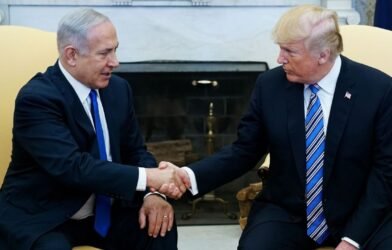Subtotal $0.00
The world is holding its breath for a global trade war between United States of America and ChinaAfter the U.S. President announced Donald Trump Recently, the Customs duty 25% on aluminum and steel imports, including 60 billion worth of Chinese goods dollar.
Trump's pretexts
The U.S. administration gave four reasons for the announcement:
I. China's aggression against the rights of Intellectual propertyThe United States claims it loses hundreds of millions of dollars a year as a result of China's tolerance of intellectual property infringement of U.S. products.
This means billions of dollars in lost revenue over years, which China denies and is asking complainants to Asylumto local courts and laws, which they say ensure that intellectual property rights are protected.
| “ Trump seems to believe that economic wars are easy and inexpensive, as he stated in one of his tweets; therefore, he seems to want to reap big financial gains by pressuring others, in order to provide his voters with the money and jobs he has been promising them. He wants to reap it not only from China, but from all parties, including his allies such as Saudi Arabia, Japan, and the Europeans “ |
Second: China's reciprocity, as China imposes 25% tariffs on U.S. cars, according to the U.S. president.
Third: China's manipulation of local currency prices (Yuan) to keep it low against the US dollar, which makes China's export competitiveness greater, due to the cheapness of its goods and the difficulty of importing US goods due to the high price of the dollar against the yuan.
IV: Adjustment Trade balance The annual trade volume between the two countries is heavily skewed toward China, with an annual trade volume of about $800 billion and a trade deficit in China's favor of about $375 billion. The Chinese respond that it is not their fault that American goods are not as competitive as they should be.
For its part, the Beijing that it will respond to the U.S. move, which it described as unjustified, and demanded Washington to negotiate solutions to the crisis. Amid US disregard for the Chinese offer, Beijing announced countermeasures by imposing tariffs on three billion dollars worth of US agricultural products as an initial response.Declaration
In turn, the World Trade Organization -which America has long sought to persuade the countries of the world to join and remove barriers to its expansion, that the US measures are illegal, which angered Washington, which announced that it would punish the organization and accused it of ineffectiveness.
Trump's tariffs were going to include European allies, but he quickly backtracked. Trump's tariffs would have included Canada and Mexicoprovided these countries make concessions to the United States in other areas.
Trump seems to believe that economic wars are easy and inexpensive, as he stated in one of his tweets, so he seems to want to reap big financial gains by pressuring others, in order to provide his voters with the money and jobs he has been promising them. And he wants to reap it not only from China, but from all parties, including his allies Like Saudi Arabia and Japan and Europeans.
However, many economists emphasize that no one wins from trade wars, as evidenced by the fact that such wars greatly contributed to the deepening of the Great Depression that hit America in the mid-1930s.
Raising tariffs will increase the cost of goods, which means that consumers will either refrain from spending, or buy cheap imported products and avoid buying expensive local products, which will lead to a slowdown in the market and loss of profits and jobs.
For example, steel - on which Trump wants to impose tariffs - is used in the American automobile industry, so if the price of imported steel rises due to higher tariffs, the cost of producing American cars will rise and therefore their prices will also rise, which will reduce the competition of American cars to their imported counterparts, which means a painful blow to this vital sector in American economy.
Chinese response
In contrast, the correlation of Chinese economy The Chinese economy has become so organically linked to its U.S. counterpart that any damage to the U.S. economy will lead to a major loss for the Chinese economy, as China is America's largest foreign creditor.Declaration
China has $1.17 trillion directly invested in U.S. Treasuries and is heavily invested in major U.S. companies, so such a move would deal a blow to U.S. stock markets or the dollar, which China cannot do at this time.
| “ There is no doubt that the trade war, which Trump has begun to ignite, will not stop at the borders of the two countries, but will affect the entire global economy, especially the Arab economies, as the largest Arab economies are rentier economies that depend on the export of oil and gas whose contracts are denominated in US dollars, and if the US dollar collapses, they will receive a severe blow “ |
China's announced countermeasures are only an initial response, and it is likely that it will resort to smart sanctions that will not cause significant damage to the US economy, but will directly affect those voters who support Trump and damage his image in front of them, so it is a political sanction wrapped in a commercial cover.
It may even reduce the purchase of U.S. Treasuries, making it more difficult for the U.S., the world's largest debtor, to meet some of its domestic and foreign obligations.
Chinese responses to the US decision may not stop at an economic response, as US interests are spread all over the world, especially in Asia, which is China's backyard.
The North Korean leader's reportedly unannounced visit to China may have been to consult with the Chinese ally on potential negotiations with the United States, as the latter seeks successful negotiations with North Korea to add important points to President Trump's tally.
Will China support these pending negotiations to give Trump a free boost in front of his voters? Or will it convince the North Korean ally to stall and drag its feet until Trump's term expires without achieving anything in this field?
If the economy is so closely tied to politics, will the Chinese cards stop at North Korea? Or will political and economic mines begin to explode in America's face in other parts of the world, such as Africa and Latin America - encouraged by China?Declaration
There is no doubt that the trade war - which Trump has begun to ignite - will not stop at the borders of the two countries, but will affect the entire global economy, especially the Arab economies, as the largest Arab economies are rentier economies that depend on the export of oil and gas whose contracts are denominated in US dollars, and if the US dollar collapses, they will receive a devastating blow.
However, oil prices have fallen dramatically, hurting the economies of these countries and causing them to shrink, amid talk that the region's oil could become obsolete or less dependent on it in the not-too-distant future.
In favor of other types of alternative energy, or a sharp drop in demand as a result of increased US production and reduced dependence, and increased Russian production, which will lead to a significant drop in prices due to the oversupply of oil on the market.
So, will Trump have dropped the first domino in a global trade war, and it is only a matter of time before the rest of the stones collapse? Or will it be a transient tremor that China will overcome and will not affect its relations with America? It seems that it will not be long before we get the answer to this question.











